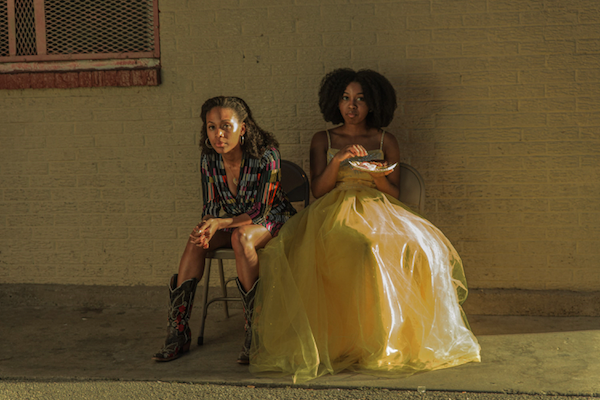Movie review by Greg Carlson
Channing Godfrey Peoples makes a noteworthy debut as feature writer/director with “Miss Juneteenth,” a 2020 Sundance Film Festival premiere now collecting early — and well-deserved — award season accolades including, among others, a Bingham Ray Breakthrough Director nomination from the IFP Gotham Awards. The film provides lead performer Nicole Beharie with all the room she needs to shape Peoples’s central creation Turquoise Jones into one of the year’s most unforgettable characters. And it doesn’t hurt that Beharie is surrounded by such a gifted supporting cast. The result is stirring and sharp.
Depicting her home town of Fort Worth with a native’s level of observational clarity, Peoples adds her film to a list of revered titles that have come to represent different geographical and cultural parts of Texas. Closer to the interpersonally intimate “Tender Mercies” and “Places in the Heart” (and even “Paris, Texas”) than to several genre icons that have become synonymous with the Lone Star State, “Miss Juneteenth” paints a vivid portrait of the nation’s thirteenth-largest city. But like all great movies, the core of the story is universal.
Peoples juggles several conflicts, including a romantic triangle placing the protagonist between her employer Bacon (Akron Watson), a mortician who runs the funeral parlor where Turquoise holds down her second job, and Ronnie (Kendrick Sampson), the auto mechanic who is the father of Turquoise’s teenage daughter Kai (Alexis Chikaeze). The heart of the narrative, though, explores the complex contours of the mother-child relationship. Turquoise’s intense and borderline obsessive focus on Kai’s participation in the Miss Juneteenth pageant resonates in every scene in the movie.
With a flair for economy in dialogue, Peoples trusts viewers to gather all necessary information to understand the motivations of the heroine. A previous Miss Juneteenth winner, Turquoise faces constant reminders that she never lived up to the promise of the crown. Her own mother’s alcoholism, partially hidden behind the depth of religious faith, alludes to just one set of possible sacrifices made by Turquoise not that long ago. The multi-generational divide also works as a cautionary warning to Turquoise that history could repeat itself if she pushes Kai too hard.
The competition of the Miss Juneteenth pageant, with a scholarship on the line, builds in a certain degree of anticipation for the viewer, and Peoples exploits several small crises ahead of the main event to heighten the tension. Will Turquoise be able to get enough cash together to acquire the special dress she believes will give Kai an edge? Will Ronnie fulfill his promises? Will Kai stick with the plan to perform Maya Angelou’s “Phenomenal Woman” in the talent showcase? Some of the outcomes are expected while others surprise, but none strain credulity or undermine the solid foundation Peoples meticulously constructs.
One of the most rewarding dimensions of “Miss Juneteenth” is the insightful manner with which Peoples guides the viewer through the world of the pageant itself. Cognizant of how outsiders might react to some of the old-fashioned and deeply ingrained expectations about femininity and womanhood that may now seem out of place, Peoples does not shy away from interrogating questionable details and traditions. But the pageant also represents Juneteenth and its historical importance, and the filmmaker recognizes her opportunity to educate viewers. That she does so with such subtlety and grace speaks to a real talent.
